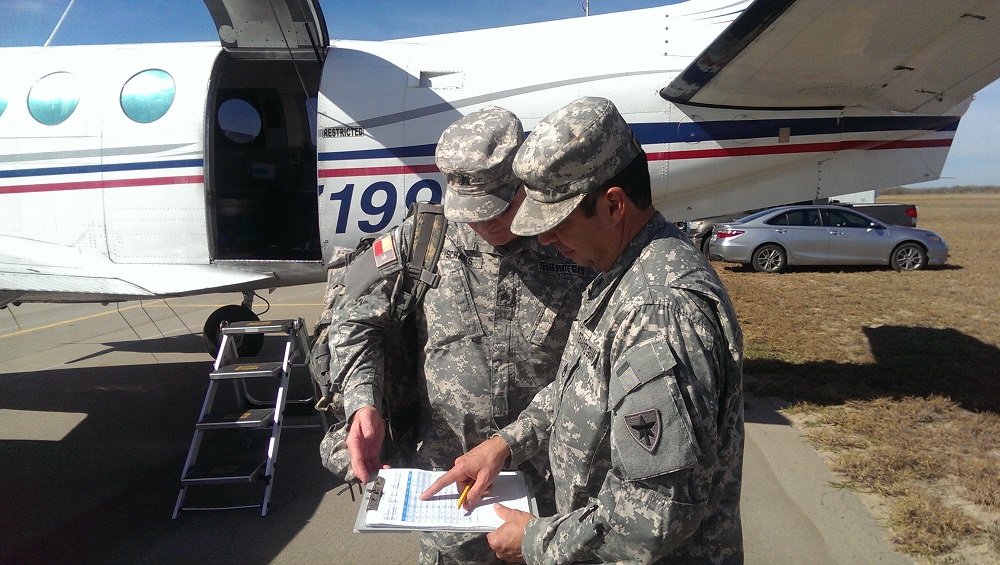 Sgt. Stephen Schaus, 3rd Battalion, 1st Regiment, Texas State Guard, reviews the daily flight plan and the amount of bait to be dropped with Staff Sgt. Joel Hernandez, 3rd Battalion, during the aerial rabies vaccine bait distribution over the Zapata-based Border Maintenance Zone during the Oral Rabies Vaccination Program, sponsored by the Texas Department of State Health Services Zoonosis Control Branch, January 10, 2018. (Texas State Guard photo by Capt. Stephen Walker)
Sgt. Stephen Schaus, 3rd Battalion, 1st Regiment, Texas State Guard, reviews the daily flight plan and the amount of bait to be dropped with Staff Sgt. Joel Hernandez, 3rd Battalion, during the aerial rabies vaccine bait distribution over the Zapata-based Border Maintenance Zone during the Oral Rabies Vaccination Program, sponsored by the Texas Department of State Health Services Zoonosis Control Branch, January 10, 2018. (Texas State Guard photo by Capt. Stephen Walker)
Story by: Chief Warrant Officer Three Janet Schmelzer
Texas State Guard Public Affairs
ALPINE, Texas – Six members from the 1st Regiment, Texas State Guard, climbed into the cockpits and rear cabins of Beechcraft aircraft January 10-20, 2018 to support a vital public health and environmental program along the Rio Grande Valley.
Now in its 24th year, the Oral Rabies Vaccination Program is sponsored and run by the Texas Department of State Health Services, Zoonosis Control Branch. In their 15th year assisting with the aerial distribution of the rabies vaccine bait packets, citizen-Guardsmen continue to give back to the Texas communities.
The ORVP is a joint operation of state and federal agencies along with businesses, to control and eradicate the spread of rabies among grey foxes and coyotes with the goal of helping to eliminate the threat of rabies from spreading to humans and domesticated animals. The operation covered 16,400 square miles in three border maintenance zones--Zapata, Del Rio and Alpine.
This year Guardsmen assisted in distributing more than one million vaccine/baits across a zone covering 19 Texas counties.
“The Texas State Guard, as a force multiplier, was ready to support this vital operation in any way that we could,” said Texas State Guard ORVP mission officer in charge, Capt. Stephen Walker, 3rd Battalion, 1st Regiment. “During this mission we provided manpower as navigators in the cockpit and operated the bait drop distributor in the back of the plane. On the ground we unloaded and loaded bait from delivery trucks onto aircraft and cleaned hangers and debris from the flight line.”
The navigators, who serve as the “eyes in the sky,” monitor the GPS system for correct flight alignment as well as control and monitor the amount of bait distributed. Additionally, they are responsible for warning the pilot of radio towers, birds and other aircraft, and maintaining a comprehensive flight log.
The bait distributors funnel bait into the bait counters and the aerial distributors, while also helping to load and unload plastic bags of bait, clean hangers, keep the area clear of debris, assist ground crews and maintain a safety zone around aircraft.
“We do any task from throwing out trash, cleaning toilets, moving equipment, policing runways and preparing baits for loading,” said Staff Sgt. Joel Hernandez, 3rd Battalion, 1st Regiment, who operated a bait distribution equipment in drop zones.
According to statistics from the Department of State Health Services, the program has been successful in controlling the spread of rabies since its inception in 1995. Not a single case of domestic dog/coyote variant rabies in South Texas has been recorded since 2005 or of the Texas Fox variant rabies in West-Central Texas since 2014. No human cases of the coyote and gray fox rabies virus have been reported since the program began.
“We are proud to be part of a program that helps to prevent the spread of rabies and as a result contributes to savings in health care costs as fewer humans are exposed to rabies,” said Walker. “This impacts the environment and the economy in a positive way and reduces the exposure of livestock and wildlife to rabid animals.”
Guardsmen joined forces with partnering agencies to undergo the necessary training for a successful mission. Dr. Ronald Tyler, DSHS Public Health Region 11 Zoonosis Control Branch veterinarian and Angel Guevara, Public Health Specialist conducted training on the safe handling of the rabies vaccine/bait packets.
“It is very important for us to understand the proper way to handle baits. We wear gloves and tight-fitting clothing so that our skin is not exposed to the vaccine. We stay hydrated while flying, just as we would do if we were on a mission on the ground. Drinking water also helps us to avoid air sickness from the very smelly fish meal that covers the packets,” said Hernandez.
For Pfc. Kevin Stepherson, 3rd Battalion, 1st Regiment, the importance of ORVP and stopping the spread of rabies is clear.
“There is no doubt in my mind that this program saves people’s lives. That is why I am here and why I am proud member of the Texas State Guard,” he said.
The Texas Oral Rabies Vaccination Program utilizes the services of such local, state and federal agencies and businesses such as the Texas Department of State Health Services, Texas Cooperative Extension Wildlife Services, Texas Parks and Wildlife Department, U.S. Department of Agriculture Wildlife Services, Texas Military Department, Centers for Disease Control and Prevention, Dynamic Aviation Group, Inc. and the U.S. Army Veterinary Laboratory in Fort Sam Houston, San Antonio.